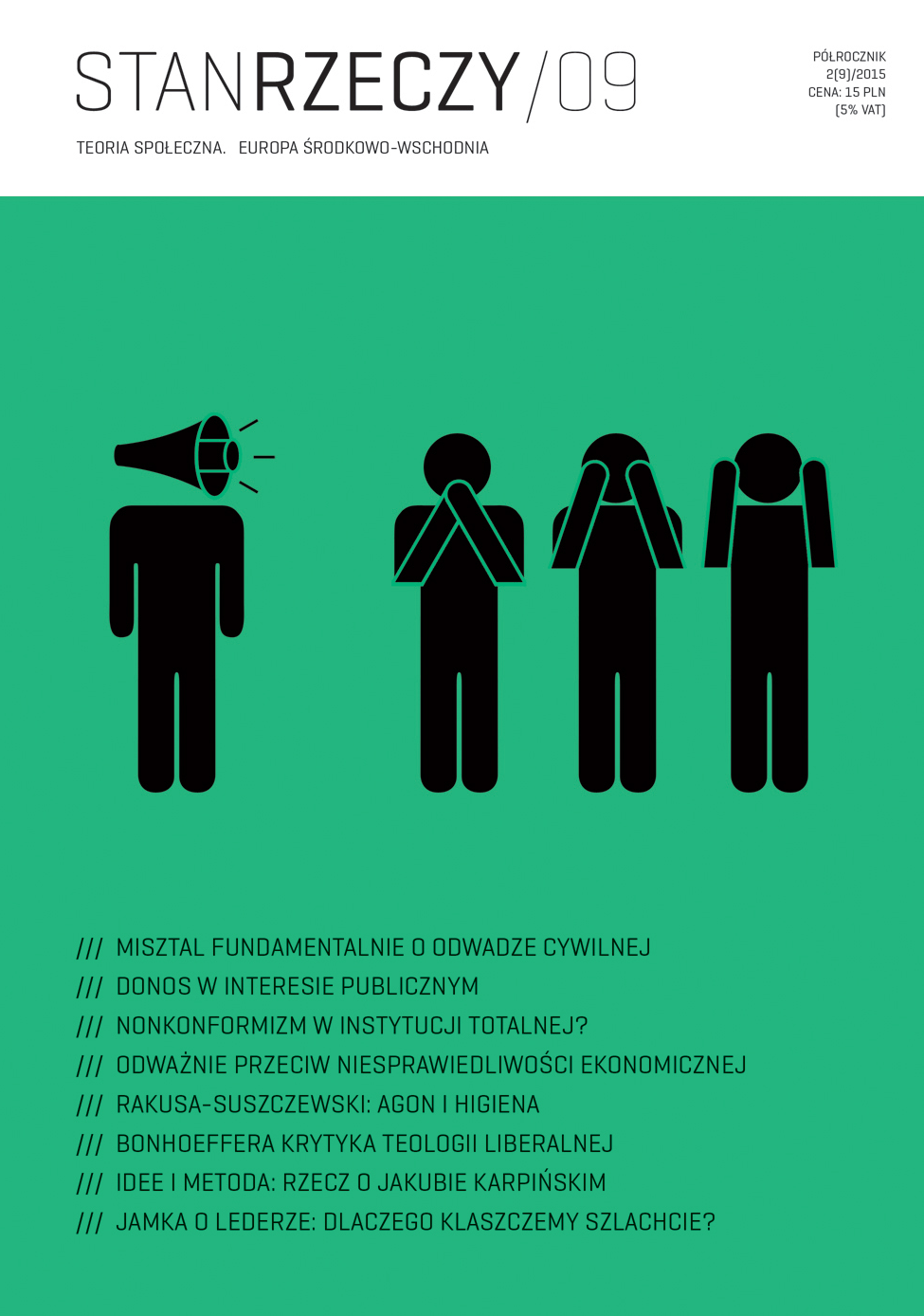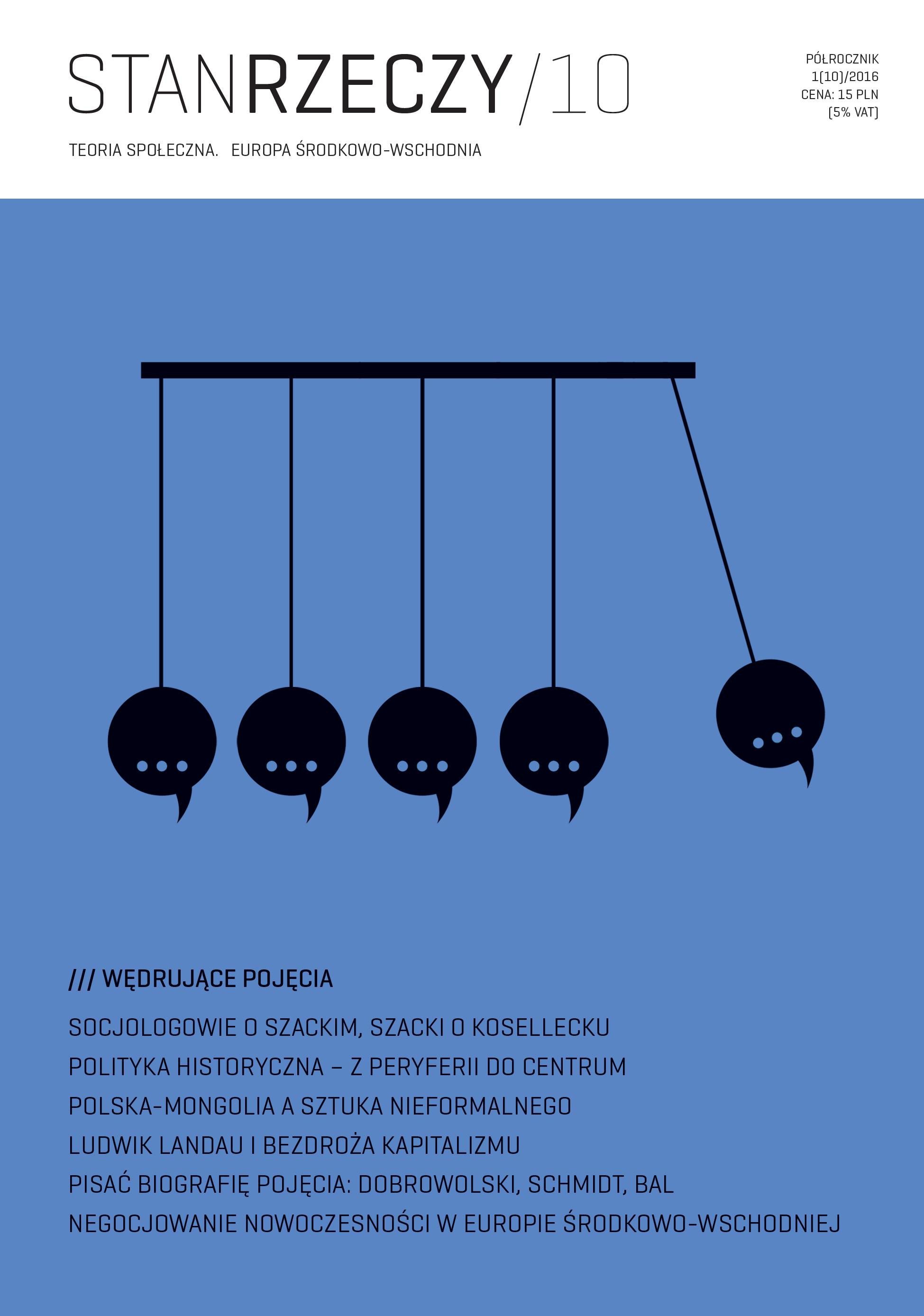
We kindly inform you that, as long as the subject affiliation of our 300.000+ articles is in progress, you might get unsufficient or no results on your third level or second level search. In this case, please broaden your search criteria.











This article deals with a key figure of interwar Polish statistics andeconomics, Ludwik Landau (1902–1944) and his contributions to understandingEastern Europe as part of one world economy in the first half of the twentieth century. His key statistical publication, entitled World Economy(1939), was one of the first attempts to depict the world through the lens of global inequalities, a socio-scientific imaginary that became salient andtaken for granted after the Second World War and in the wake of decolonization.The article aims to explain the ways in which Central and East European Marxism, on the one hand, and international comparative statistics,on the other, were two intellectual resources that Landau combined in his representation of the vulnerable position of Eastern Europe in globalcapitalism.
More...
Although the impact outside the U.K. of E.P. Thompson’s work, The Making of the English Working Class (1963), has been recognized and pointed to many times, the ways in which Thompsonian categories and concepts, or Marxist thought from the West more broadly, was received in the countries of the former Eastern Bloc remain rather unclear. This paper traces the ways in which historians of the GDR, Poland and Czechoslovakia responded to these challenges to the official position of Marxist orthodoxy. Taking Thompson´s seminal piece as an example, it highlights the reception (or lack thereof) of Western influences on local scholarship and the dynamics of these encounters – whether they were affirmative or critical – in relation to the changing political landscape of East-Central European countries after World War II.
More...

In this article, I show how an anthropological understanding of informality and also spontaneous forms of social collaboration or self-organisation may change and develop when related to the concrete site and particular context of research. I am concerned with how the informal sector is recognised by researchers and as a kind of failure or as something defective which holds back modernisation and development programmes. I introduce the notion of “the art of the informal”, which encompasses and underlines some positive aspects of informal collaboration and a certain independent self-organisation. I analyse “the art of the informal” in the contexts of post-socialist Poland, Central-Eastern Europe, the former Soviet bloc, and especially contemporary Mongolia. I try to show that the informal ties existing in local traditions may signify grassroots forms of collaboration and an impulse for self-organisation. At the same time, I show how shifting from the context of postsocialist Europe to the context of contemporary Mongolia requires creating constantly new notions in order to name the informal processes vis-à-vis local cosmologies and imaginaries.
More...
This paper undertakes a semantic analysis of the concept of historical politics, which is key to understanding the social transformations of the Third Republic and modernity in general. The idea of historical politics was popularized by the end of the 1990s by intellectuals associated with the Warsaw Club of Political Criticism (WKKP) and gained resonance as one of the cornerstones of the semantic revolution of the Law and Justice Party in the years 2003–2005. The institutionalization of this concept was the opening in 2004 of the Warsaw Rising Museum, whose co-creators were members of WKKP. The concept of historical politics appeared in the context of a critique of modernity and its characteristic break with the past to choose the future. At the same time, the concept of historical politics had a modern dimension: in the pursuit of a revolutionary transformation of reality, it chose a future that was not a break from the past, but a return to it. This article also references the prehistory of the concept in Bronisław Trentowski’s and August Cieszkowski’s philosophy of history, showing the deep layers of meaning of politics and history.
More...
This article introduces how the concept of “the intellectual” travels among languages and national cultures, disciplines (philosophy – history – sociology), and also between everyday language and scholarly language. In various stages of this travel, the concept experienced periods of popularity and glory but also exile and devaluation when it became a politicised label. The example of the concept of “the intellectual” shows that the adoption of concepts in a given local context depends on social reception and socio-political conditions. Consequently, it is impossible to analyse the travel of concepts without an analysis of social phenomena. Therefore, the author of the article suggests reading Travelling Concepts in the Humanities by Mieke Bal from the perspective of historical and interpretative sociology.
More...
The paper deals with relations between Czech and Polish sociological communities. In both countries, sociology was institutionalised shortly after the First World War, liquidated by the Communists, and renewed in the post-Stalinist period, but in Communist Czechoslovakia, it developed relatively freely only during a brief period in the 1960s. There existed a mutual interest between the sociologists of the two countries, although they did not have much contact, except in the 1960s. Most of the time, the Czechs were more interested in Polish social science than the other way around. The intensity and asymmetry of their relations can be best explained by the changing position of both countries within the international scholarly community. After the Second World War, they remained on the semiperiphery of the Western scholarly community, even though in the Communist period they belonged to the supposedly alternative world of Marxist sociology. The exceptional position of Polish sociology in Czechoslovakia in the 1960s was therefore the result of its role as an intermediary for accessing the dominant Western sociology.
More...
Stefan Nowak’s thesis on the sociological vacuum is the most frequently referenced statement on Polish society. This article introduces how Polish society was perceived “from the outside” by the use of the vacuum concept and shows attempts to apply the concept to other societies. The sociological vacuum is compared to other similar concepts: the loss of community, the hourglass society, and the missing middle approach. The concept’s travel between four domains (Solidarity, civil society, social capital, and the qua- lity of democracy) is presented. The concept of the sociological vacuum has not travelled beyond the Polish context because it is strongly connected to the assumption of Polish uniqueness. During its travels through various thematic domains, the concept transformed, and it is currently a buzzword used to explain phenomena undesired by sociologists.
More...
This article is about problems related to translations in the social sciences and their circulation in the contemporary world. Drawing on Pierre Bayard’s concept of “non-reading”, the author reconstructs the ideal of scientific translation and analyses the ideological consequences of the orientation it produces in translators’ work and its impact on the creation of sociological knowledge and on the academic teaching of sociology in particular.
More...
This essay follows Mieke Bal’s narrative on travelling concepts stemming from failures in interdisciplinary communication in academic discussion and teaching. Her approach is compared to Polish scientist Antoni B. Dobrowolski’s project of an archive of biographies of creative thought (1927) that aimed to solve specific problems in the Polish educational system. Whereas Bal sheds light on the intersubjective potential of concepts, Dobrowolski aimed to question scholars to get insight into the thickets of thought. Both initiatives for stronger academic introspection are compared and the latter’s failure is examined against its historical background, namely a general tendency of self-optimization, represented by a German collection of autobiographical texts by great scholars edited by Raymund Schmidt and others.
More...